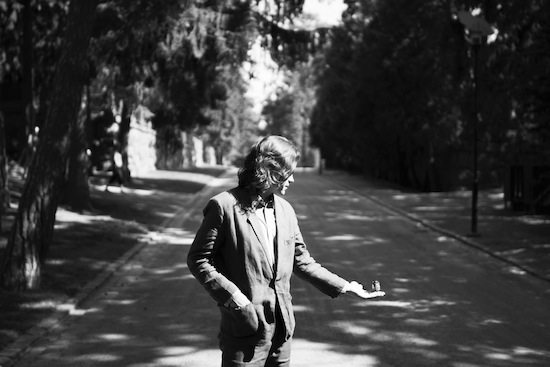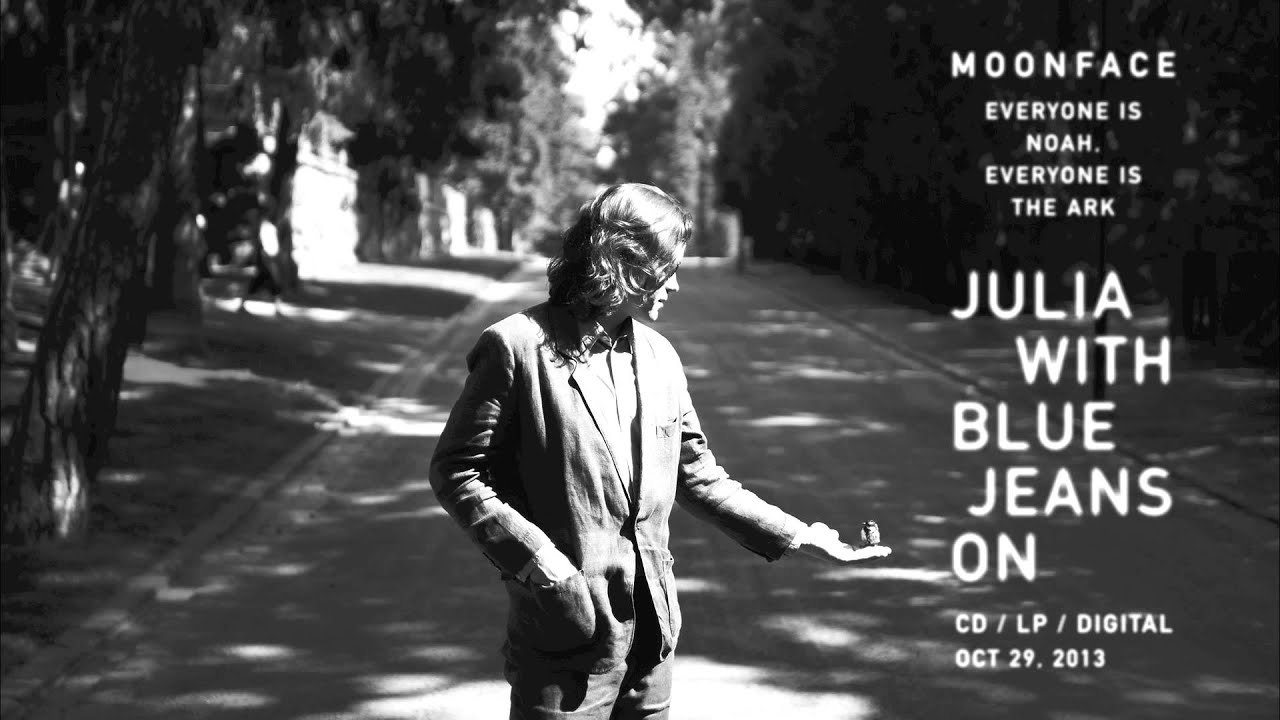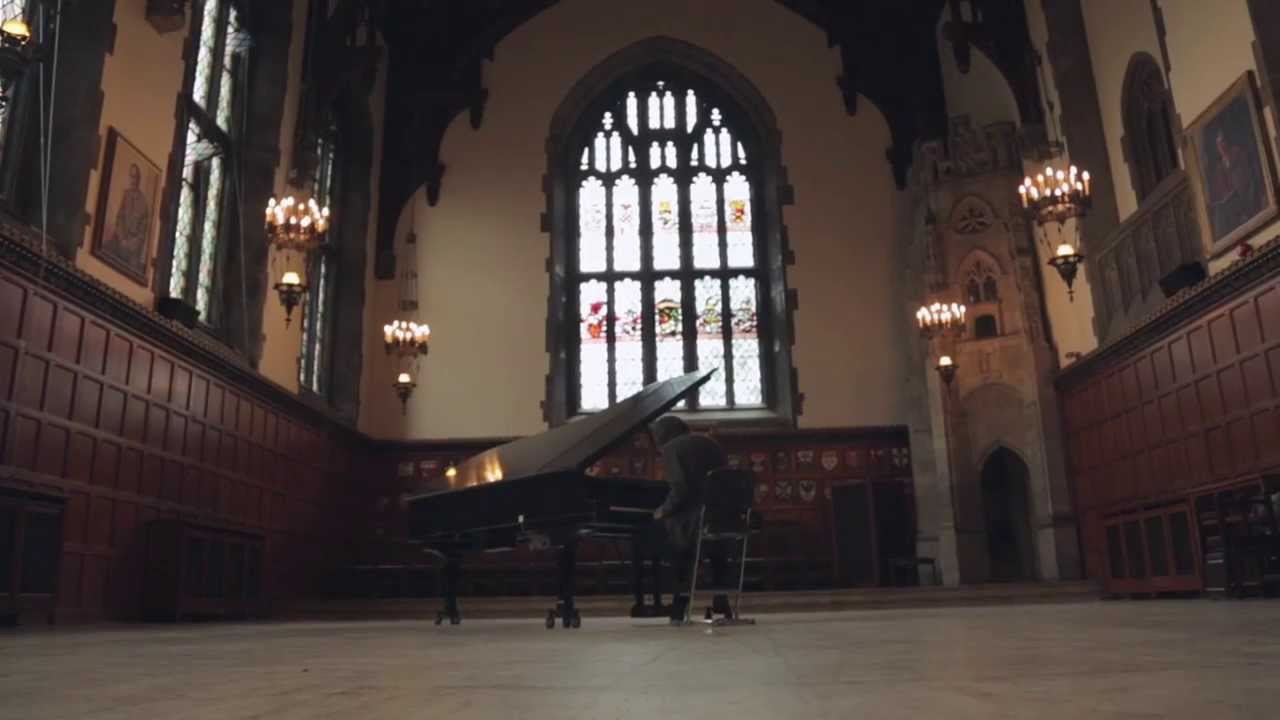On Monday, prolific multi-instrumentalist Spencer Krug, released his third album as Moonface, Julia With Blue Jeans On. It’s the follow-up to last year’s Heartbreaking Bravery, which he recorded with Finnish band Siinai, having himself relocated to Helsinki after a decade as a key figure in the Canadian indie scene, being a member of Wolf Parade, Sunset Rubdown and Swan Lake, among others. Julia…, however, marks a complete departure from that album’s anthemic, motorik-indebted rock, eschewing all other instruments for a set of songs featuring solely Krug’s voice and his piano.
It’s not the first time he’s gone in for creative limitation, with the first two Moonface releases’ titles – Dreamland EP: Marimba And Shit-Drums and Organ Music Not Vibraphone Like I’d Hoped – telling of their predominant arrangements, but here Krug wears the mantle of the classic singer-songwriter supremely well. Melodrama and religious imagery underline bracingly direct lyrics, coming together in particularly fine form on ‘Everyone Is Noah, Everyone Is The Ark’ and ‘Love The House You’re In’, while elsewhere, the album’s plangent tones take on a cinematic scope, as on the eight-minute, almost-instrumental centrepiece ‘Dreamy Summer’.
Ahead of a sold-out date at St. Pancras Old Church in London, which marks the start of a tour across North America and Europe, Krug filled us in on the album over e-mail.
Going from the large-scale rock of Siinai to just yourself and a piano is quite a big switch. What prompted the change?
Spencer Krug: Last winter – a crusher – brought on the need to withdraw and be more introverted, creatively and otherwise.
I’d already bought a piano a few months earlier, because playing in rock bands for the past decade has diminished my skills on an actual acoustic piano, and I wanted to reacquaint myself with the instrument; remember how to play. I also thought that this would be a good way to stay sane through the Finnish darkness, though in the end it probably just led to a different kind of insanity specific to making solo albums. I put the piano in a studio and went there every other day.
Siinai had recently come off of our fall tours, pounding out the somewhat angry Heartbreaking Bravery tunes every night, and I guess the simple, straightforward sound of the piano was refreshing. I have been using so many machines to make music for so long, and hearing so many machines in music in general, so I almost instantly fell for the idea of making a piano album; something simple and beautiful; the straightforward challenge of making songs with two hands and one voice, and relying on movement, not volume, to create effect; some sort of half-assed virtuosity as an answer to the arpeggio knobs of synthesisers, which everyone’s fingers (mine included), seem so ready and willing to twiddle these days.
Did you start out with the intention of writing songs purely for solo voice and piano or did this reveal itself to be the best set-up over time?
SK: It revealed itself, but fairly quickly, as described above. And once I’d bound myself to the idea that it would be completely solo, that there would be no overdubs (vocal or otherwise), and that I’d record the thing live, then there was no question of set-up, just the question of what was possible for me to make with a piano.
Did you take influence from any particular pianists or albums with similar arrangements?
SK: Somewhere near the end of the writing process I discovered this instrumental piano album by Rachel Grimes called Book Of Leaves. Hearing it made me want to flush all my own arrangements down the drain and go get a job washing windows. Sometimes "inspiration" can be quite humbling. But I held on. Hearing the lyrics of Nick Cave’s latest probably had a similar effect on me.
Then there is always Erik Satie and Philip Glass. That sort of stuff. Have you seen Stoker? More specifically, have you heard the piano duet in Stoker?
Lyrically, the album feels unsparingly honest, an honesty that’s sometimes direct feeling, at other times veiled in poetics and metaphor. Were the words hard to write or more of an exercise in catharsis? Is it daunting to set these in an arrangement which pushes them so much to the forefront?
No, it’s not daunting. I used to really want to bury my vocals deep in the mix, so you couldn’t actually hear what I’m saying. I was shy and embarrassed about my lyrics. For better or for worse, I’m over all that now, and perhaps this album was the final step in that new direction. It was a relief to have them so bare and audible, it made it fun to turn them up instead of down. This is the story of the wallflower who finally gets on the dance floor and then has a blast (regardless of his dancing abilities).
Piano music is very straightforward and unveiled, and the lyrics naturally wanted to follow suit. It’s an interesting challenge to try to write words that are "straightforward and unveiled", yet still carry some kind of emotional impact. I think in some ways it’s more challenging than using metaphor. But then, yeah, there’s still some metaphor in there as well. It’s a mixed bag.
The last time we talked to you, you said, of Moonface: "It is a sort of alter-ego, yes, but more to allow me to indulge in melodrama if I feel like it, or conversely, be more honest." It seems like the new album is perhaps the strongest realisation of that so far – would that be a fair assessment?
SK: I guess so. But the irony now is that this album came off so honest (or exposed) that putting it out as Moonface and not just "Spencer Krug" seemed even weirder than ever. If "Moonface" is some mask to wear when I’m being melodramatic – some character – then what is its purpose when I’m just telling the truth? And I’m not talking here about the kind of honesty I meant previously, in the statement you quoted above; an honesty that’s so brutal you can’t look people in the eye. That’s more the style of Heartbreaking Bravery. This album is different. There’s a sort of tender normality to the truth-telling in these songs, truths that seem inappropriate to be singing while wearing a bag over you head. But either way, I couldn’t let the name go. So, in this way, I guess, this album makes "Moonface" just another spelling of my own name than ever before.
There are a number of references to Biblical imagery – Noah, the Ark, Cain, the two ‘Barbarian’ songs – across the album. What made these so appealing for your lyrics?
SK: I really don’t know. I didn’t notice this trend until after the songs were done. I’m not religious. I’ve never read the Bible… I just know the stories like everyone else. I hate to say it, but maybe biblical or mythological references (same thing?) are a simple tool, or even trick, for writers to use, because the words come so preloaded with imagery. When I say "Noah and the Ark", you don’t just visualise a dude and a boat. There’s a whole epic (and really weird) story flashing through your head.
On the flip-side, I do think about the notion of God, or fate, fairly often… probably.
Have you got any sense of what the next iteration of Moonface might sound like? Do you think you’ll stick with this set-up or take it somewhere entirely different?
SK: Can’t say for sure. I know that I want to make another piano album one day… I’ve already started, really. But I have a feeling the next release will be something different than anything previous. There’s a few ideas bubbling up simultaneously right now so I’ll just wait and see which one is cooked first.
Julia With Blue Jeans On is out now via Jagjaguwar; head to the label’s website to get hold of it




